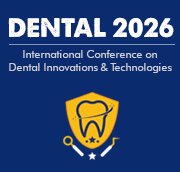AI and Machine Learning in Dentistry
AI and Machine Learning in Dentistry are transforming modern dental practices by enhancing diagnostic accuracy, treatment efficiency, and overall patient outcomes. AI-driven tools analyze radiographs and intraoral images with exceptional precision, enabling early detection of caries, periodontal disease, and other oral pathologies. Machine learning algorithms assist in treatment planning by predicting patient-specific responses and optimizing restorative and orthodontic solutions. Automated charting and predictive analytics streamline clinical workflows, reducing administrative burdens and improving decision-making. Beyond diagnostics, AI and Machine Learning in Dentistry are advancing robotic-assisted procedures and enabling personalized treatment strategies. These technological innovations not only enhance clinical efficiency but also establish new standards in patient care, making AI an essential component of the future of dentistry.

David Geoffrey Gillam
Queen Mary University of London, United Kingdom
Zvi Loewy
New York Medical College, United States
Khamis A Hassan
Global Dental Research Centre, Canada
Laurindo Moacir Sassi
Erasto Gaertner Hospital Cancer Center and Mackenzie Evangelical University Hospital, Brazil
Arnaldo Castellucci
Dr. Castellucci MD, DDS, Italy
Yasser Khaled
Marquette University, United States



Title : Efficacy of a biomin F toothpaste compared to conventional toothpastes in remineralisation and dentine hypersensitivity: An overview
David Geoffrey Gillam, Queen Mary University of London, United Kingdom
Title : Knowledge and attitudes of dental professionals in the evaluation of Molar Incisor Hypomineralisation (MIH): Awareness, diagnosis and treatment approaches: An overview
David Geoffrey Gillam, Queen Mary University of London, United Kingdom
Title : Innovative approaches to impede the pathogens implicated in COPD exacerbation
Zvi Loewy, New York Medical College, United States
Title : Enhancing root canal success strategic use of orifice opener one step synthesis gels orifice barriers
Emmanuel Samson, Consultant Total Dental Care, India
Title : The coordinated triad of spatial temporal and biomechanical strategies managing the where when and how of shrinkage stress in bulk fill resin composite restorations
Khamis A Hassan, Global Dental Research Centre, Canada
Title : Importance of clinical pharmacokinetics of medications in the postoperative period of patients undergoing dental surgical procedures
Vitoldo Antonio Kozlowski Junior, Ponta Grossa State University, Brazil